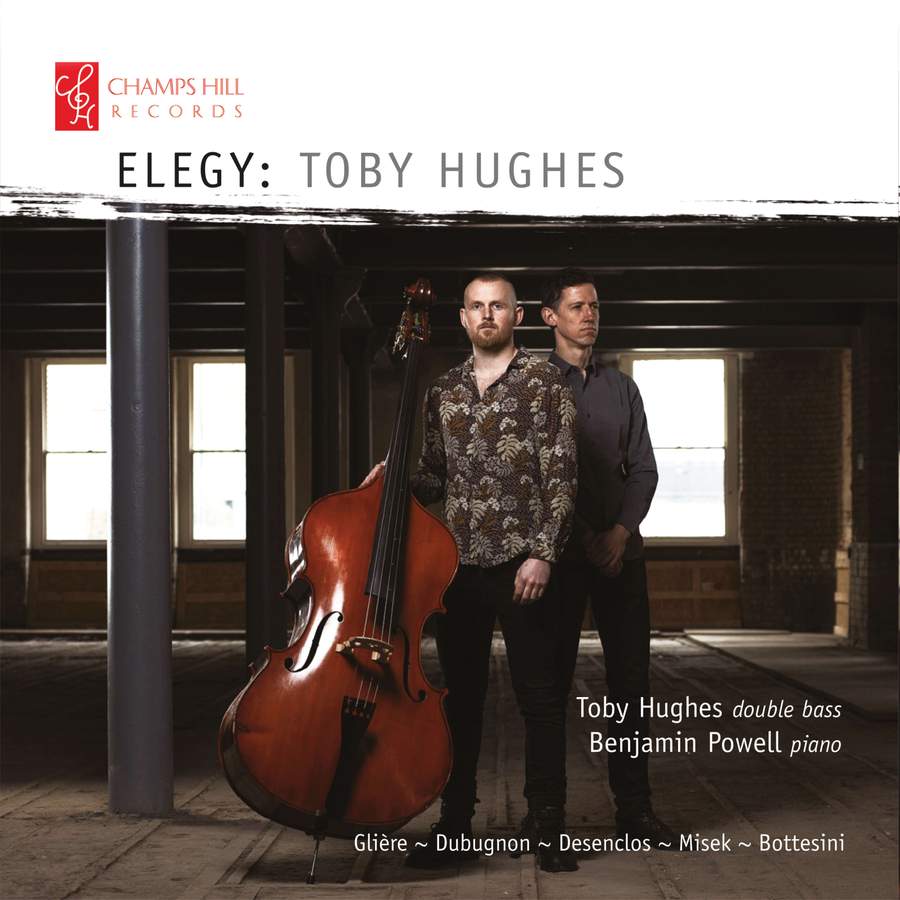Toby Hughes: Elegy
View record and artist detailsRecord and Artist Details
Genre:
Chamber
Label: Champs Hill
Magazine Review Date: 08/2021
Media Format: CD or Download
Media Runtime: 65
Mastering:
DDD
Catalogue Number: CHRCD162

Tracks:
| Composition | Artist Credit |
|---|---|
| Aria et Rondo |
Alfred Desenclos, Composer
Benjamin Powell, Piano Toby Hughes, Double bass |
| Prelude and Scherzo |
Reinhold Glière, Composer
Benjamin Powell, Piano Toby Hughes, Double bass |
| Intermezzo and Tarantelle |
Reinhold Glière, Composer
Benjamin Powell, Piano Toby Hughes, Double bass |
| Deux Ekskize, Movement: Ekskize No 1 |
Richard Dubugnon, Composer
Benjamin Powell, Piano Toby Hughes, Double bass |
| Sonata No. 2 |
Adolf Misek, Composer
Benjamin Powell, Piano Toby Hughes, Double bass |
| Elégie No. 1 |
Giovanni Bottesini, Composer
Benjamin Powell, Piano Toby Hughes, Double bass |
Author: Tim Ashley
Despite its title, Toby Hughes’s debut album is not so much a disc of elegies as an examination of the solo double bass’s expressive potential and an exploration of the 19th- and 20th-century chamber repertory written specifically for it. That Glière is the best-known composer here serves as a reminder of the instrument’s relative neglect away from its orchestral role and its associations with jazz. It’s also perhaps significant that Giovanni Bottesini (1821-89), famously, and Adolf Mišek (1875-1955) were bassists themselves, as is Richard Dubugnon (b1968): the works of all three can effectively be seen as attempts to expand their own repertory in the absence of major contributions by their contemporaries. Glière, in contrast, had the young Koussevitzky on hand for whom to compose his Four Pieces, written in two pairs as Op 9 (1902) and Op 32 (1908), while Alfred Desenclos’s Aria et rondo (1952), the only jazz-influenced work to be included, was originally intended as a test piece for Conservatoire students, though it is in some ways more substantial than that.
Some of the music is frankly uneven, though Hughes and Benjamin Powell perform it all with considerable elegance, virtuosity and flair. Hughes’s tone is wonderfully warm, his phrasing immaculate, so long lines really breathe and sing. The expansive melody of Bottesini’s first Elegy sounds particularly beautiful, while Hughes’s dynamic subtlety speaks volumes in Dubugnon’s first Ekskize, with its fragmentary phrases over shivery, Impressionistic piano chords. Mišek’s big Sonata, the most substantial work here, very retro for its time (1911) and heavily indebted to Dvořák and Brahms, combines lyricism with drama, above all in its nobly assertive opening movement and the exhilarating Furiant that forms its scherzo.
Glière’s Four Pieces include a Scherzo and Tarantella that are real virtuoso showstoppers, while Desenclos’s Aria et rondo, strongly influenced by Ravel, is by turns soulfully nostalgic and extremely witty as its rondo theme morphs into a jazz riff, complete with walking bass and ritzy syncopations. Desenclos’s piano-writing goes way beyond that of the usual Conservatoire test piece, and Powell comes very much into his own here with playing of great exuberance and subtlety. He and Hughes have a fine partnership throughout, though, thinking as one and functioning as a single expressive unit. It’s a fine, engaging disc, and hugely enjoyable.
Discover the world's largest classical music catalogue with Presto Music.

Gramophone Digital Club
- Digital Edition
- Digital Archive
- Reviews Database
- Full website access
From £8.75 / month
Subscribe
Gramophone Full Club
- Print Edition
- Digital Edition
- Digital Archive
- Reviews Database
- Full website access
From £11.00 / month
Subscribe
If you are a library, university or other organisation that would be interested in an institutional subscription to Gramophone please click here for further information.




